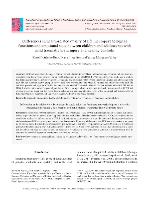Resumen
Little is known about the impact of mild traumatic brain injury (TBI) on the functioning of children in Latin America, especially regarding a broad construct called health-related quality of life (HRQoL). The objective of this study was to analyze the differences in HRQoL, neuropsychological functions and emotional state between a group of children and adolescents with mild TBI and a healthy control group. A case-control study was conducted in which 30 children and adolescents with mild TBI and their parents and a group of 30 healthy subjects participated. The results showed that participants with mild TBI had an HRQoL similar to the one of the general population of the same age and sex. At the cognitive level, the group with mild TBI had a lower processing speed and less work done in selective and sustained attention tasks; at the emotional and behavioral level, they exhibited more symptoms of anxiety, depression, withdrawal and social problems. © Asociación Española de Psicología Clínica y Psicopatología














